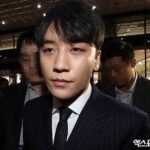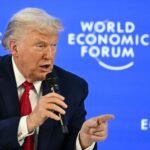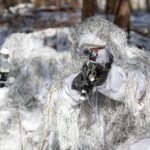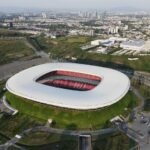This media outlet has recently met the two North Korean soldiers dispatched to Russia and taken prisoner live by the Armed Forces of Ukraine on the 9th of last month, currently in war with Russia. This is the first time the POWs have been interviewed by any media in the world. Recon agent/sniper Mr. Ri(26) and rifleman Mr. Paek(21), who each had served in the North Korean military for ten and four years each and had been dispatched to Russia’s Kursk region last October to November, had been living in solitary rooms deep within the confinement building. Although the soldiers sent to Russia had been known to be from the ‘Pokpung’ (tempest) corps, both interviewees revealed that they were soldiers ‘with Reconnaissance General Bureau’.
Mr. Ri and Paek revealed for the first time that agents from the Ministry of Social Security were keeping surveillance and controlling the dispatched North Korean soldiers, and that they created false information that ‘The ROK forces dispatched to Ukraine are attacking DPRK’s soldiers with drones’ in order to incite animosity against the enemy among the troops. Mr. Ri stated that ‘[the people from the MSS] told us that the drone pilots with Ukraine are all from the ROK’.
The two soldiers are both only sons. Mr. Ri is from Pyongyang and told the outlet that ‘[I] came here after hearing that I would be ‘sent to study overseas for training”. Mr. Paek said that ‘After my father died from illness the year I joined the forces, only my mother(50) remains alive’. Mr. Ri also stated that he ‘wants to go to the Republic of Korea’.
The interview with the POWs was held after a complicated series of negotiations. Holding the two men’s hands, the reporter could feel that they were coarse and thick unlike those of someone in their twenties. The wounds cut and lumpy calluses created from long toils and difficult training could be felt by the palm of the hand. The two men responded with hugs to words of farewell that wished ‘for us to meet together again in good health’. The interview with the prisoners will be reported in two parts. This is Part One with sniper Mr. Ri.
Editor’s Note. This outlet has decided to not reveal the true names of the prisoners during the interviews, and to not reveal in detail information that could be used in deducing their identities. This is a measure taken in order to protect the prisoners’ human rights in accordance with international regulations in regards to prisoners of war. However, in the case of the photos and videos, regarding the fact that the government of Ukriane has already revealed their faces and that the images of the faces had been spread worldwide for over a month, we have decided in our editing meeting to use photos and videos without pixelation.
“Haven’t Seen My Parents for the Ten Years in the Army, Most Soldiers are Only Sons”
<1>. Mr. Ri, sniper.
North Korean soldier Mr. Ri (26) had been dispatched to Russia’s Kursk front, and severly injured in his right arm and chin when he was captured alive by Ukraine on Jan 6th. Even in the video where he was first shown to the world, he had been making an exhausted expression and was unable to speak from his wrapped chin. Meeting Mr. Ri in his solitary confinement located somewhere in Ukraine a month later, he had already healed significantly. He had had his bandages removed from his chin and was able to speak in slurred words. His chin showed a large gunshot wound recovering.In Mr. Ri’s room was a small Chinese TV that was playing music. When the interview was about to start, he raised the remote to lower the volume. “You’re a reporter, right?” He asked, and asked questions he had in his mind sometimes during the interview. Although Mr Ri was from Pyongyang, residence of many of North Korea’s elites, he said that he had gone through many struggles in difficult conditions. He swallowed his tear, saying that he had “now been sent to the warfield gone through a near-death experience”.
-Are both of your parents in Pyongyang? (OP’s note: all questions in the original version of the article end in periods. I’ve just decided to use question marks here.)
“*nods*”
-And your siblings, too?
“It’s just me.”
-Your parents don’t know you are here, Mr. [name], do they?
“No, they don’t. It’s been three months since I was able to make contact with home.”
-When did you depart for Russia?
“It was October 10th when we left. We had been out for [flood] damage recovery efforts in Jagang-do, and then had retreated after a month… and then we had our training session in a training zone, and then arrived in Russia after leaving in early October.”
-So when did you arrive in Kursk?
“Must have been mid-December. We got transported here after undergoing training in Vladivostok.”
-Do you have anything you wish to say to your parents?
“To tell the truth, my mother and father are patients. Patients in critical condition. My father has trouble moving around, and my mother with digestion. I think that maybe if that I got caught here, that I’ve been held captive reaches our government’s ears, my father and mother wouldn’t be able to live in Pyongyang any longer.”
-What’s your originally associated unit?
“GBR.”
-Did you serve as an enlist?
“Yes, I’m at the age where I should be dismissed. I had joined in 2015.”
-I hear that you had served as a reconnaissance troop and a sniper.
“Yes.”
-What did you get told when coming to Russia?
“That I’d be training as an overseas student. Didn’t know I’d be fighting in combat.”
-When did you first learn that you’d be fighting in combat?
“After coming to Kursk, there was a standby zone and that’s when they told me.”
-How did you come to Kursk?
“Via train, airplane, and bus too.”
-How many people came here?
“About 2500.”
-North Korea currently isn’t confirming that young men of our nation are here and participating in battle.
“It’s a secret.”
-And why do you think that?
“The possibility that stances in foreign affairs would get messed up, and the like.”
-Did you have any trouble working together with Russian forces?
“Not much for us at the underside to talk about with. Most work is done by those above. Ammo issues, clothing supplies, they had it all contracted for delivery, and enlists didn’t talk much with the Russians.”
-How did you communicate?
“Translators on smartphones.”
-Did you ever use smartphones back in Pyongyang?
“The translation service I used here for the first time ever. Because I had no matters to deal with foreigners before that.”
-Is the dispatched force (Pokpung Corps) one with high loyalty?
“Since they have good fighting strength. They come first when it comes to construction work, combat missions… know the Samjiyeon constructions?”
-What is that?
“The construction work for creating the city of Samjiyeon (a tourist destination city redeveloped under Kim Jong Un’s strategies). (Our troops) left in December to join the work, and it was very snowy and cold. In 2019. We went there, and had to go to a place without any homes or settlements where the snow comes up to your chest. We had to make camp there [to live in during construction work], so you go pick stone and get a rock about this size from the ground, *acts like his hands were being frozen* it’s devastating weather. It’s so cold, you take a pee, it freezes then and there and falls to the ground.”
-Compared to Kursk, which place is colder?
-“That place (Samjiyeon). Here’s nothing.”
-How are the meals living here?
“My chin isn’t fully healed so I can’t eat anything too solid. Something like porridges… I want to eat ramyeon but I can’t eat that.”
-How did you get the injuries on your chin and arm?
“We had been in combat since January 5th. The units in front of us all got sacrificed. Sacrificed from drones and artillery. We had to take some reckless losses because the Russian side wouldn’t give us enough [defensive] artillery support. And when they did make the cannon shots, it was behind (Ukrainian) lines, so we took some needless losses.”
-How many had been out in the field that day?
“Three people in a rear strike squad… The other companies start attacking at the start and end of the windbreak forest. We get in the middle of that and start striking the back after distracting them. But we got ambushed going in there… we could have not gotten caught, but the drones spotted us.”
-Did you not learn about the drones in detail during training?
“We did. No battle formations against drones, or anything like that. Our training was like ‘the quicker guys live”. So if the drones appear, we were supposed to run or hide behind some cover, or shoot from the ground, and there was no training for taking the drones down.”
-So I guess you learned more about the drones bit by bit from your losses?
“Yes.”
-What did you do after the drone discovered you?
“Our squad is three people, and the leader and the guy below me had already fallen from gunfire. So I desperately tried to shoot back from the ground while taking cover in some advantageous spot, and then I got shot.”
-Where did you get shot?
“The bullet passed through my arm while snapping the bone, and hit my chin. My chin was all broken up. Then I fainted… I guess I fainted from losing too much blood. I opened my eyes and it was night. It had been daybreak when I got shot. And then when I tried to stand up, I got dizzy from my lack of blood… and I sat there for a while, and while going back the way I came I met with a company, not our company, but another one in our battalion. So they wrapped [my chin and arm] like this.”
-Then why didn’t you return with them after being treated?
“So then I tried to go with them but… ever heard of a ‘demon drone’?”
“I was Only Survivor in Company, Would have Blown Self up if Grenade Available”
-What is that?
“It’s a really large drone that carries bombs… it has a thermal detector, and it drops bombs every night. The thing circled over, searched the ground and dropped grenades so we couldn’t return. So [first] we took cover where we had been controlling. But at about 3AM the Ukrainian forces came to us in armored cars and shot machine guns from the car, while sending soldiers to take where we were controlling. Because staying there would mean it would be over for us, we said ‘let’s leave’ and started to retreat, but then the drone attacked again so the guys who saved me die one and then another, and eventually I was the only one left alive.”
-From how many were you the only one remaining?
“There were five people other than me and all five of them were sacrificed.”
-What happened next?
“So the night was pitch black, and since I didn’t know much about the terrain, I scoured the hills and decided from my instincts that ‘get over that peak and it should be our area’ and then going there, it wasn’t where I thought it was.”
-You got lost.
“I got lost… so and then I searched for the way again, and then while going up another side I became prisoner. [They say] that I wasn’t able to use my arm, and that I had no weapons on my bulletproof vest, no grenades or knives. And I was injured and unable to carry anything heavy… So I would have been caught even if I resisted. If I had a grenade, I might have blown myself up…”
-Were you ordered to blow yourself up?
“In our People’s Army, being taken prisoner is like defecting to the enemy.” (So he was ordered to blow himself up if he ever got caught)
-What should you do from now on?
“Lots of thoughts going around.”
-And I think you would want to see your parents, too.
“I miss them so much, it’s unbearable. *thinks for a long while* I was stationed in Sinchon, Hwanghaenam-do. Close to Pyongyang. [But] I couldn’t return home even once during my time in service.”
-Not once, even during those ten years?
“Yes, I talked to them a lot over the phone, but I never met my parents face to face.”
-If you return to North Korea now, there will be a lot of struggles again.
“Of course.”
-Do you have anything in mind about your future?
“*nods head* I’ve made up about 80% of my mind.”
-And what have you decided?
“*Thinks for a long time* you said you’re a reporter, right? *Thinks for a long time, again* So I first want to sign up for refugee status and *thinks for a short while* and go to the Republic of Korea. If I sign up for refugee, would they let me in?” (In regards to this, a Ukrainian official had stated that ‘whether it is possible for the North Korean soldiers to go to South Korea depends on the South Korean government.)
-Do you have anything you wish to say to your comrades-in-arms in Kursk?
“I would first like to know how the battle situation is going. Has Kursk been completely liberated yet?” (Meaning whether Ukraine has been fully pushed out of Kursk)
-No, not completely.
“*sighs*”
-Is there any possibility North Korean forces will be sent to any place other than Kursk?
“They said that we were going to liberate Kursk. You know there’re those in Kursk. There’re uranium and nuclear [facilities].”
-There are nuclear generators, electricity generators using atomic power. Are the North Korean forces supposed to safeguard those?
“Yes.”
-And those are the most important items of interest in this operation.
“*nods*”
-Is there anyone from your comrades-in-arms that came here together to Kursk that you think about?
“They’ve all been sacrificed. Every one who came to the army together with me has been lost. I’m the only one not lost in my company.”
-About how big is a company?
“Around 63 to 65… our batchmates were eight, but they’re all gone now. There’s only me left. It was my first ever battle in my entire life. Looking at my colleagues’ corpses really got me thinking. Blew themselves up [thinking they might get caught as POWs] and one has no head, one has no torso… it’s snowing in freezing cold but the smell of blood coming from their bodies still…”
-How were you ordered to take care of your colleagues’ bodies?
“They said [they’d] find the bodies and take them back…”
-But you have never seen them actually recover them?
“*nod*” (OP’s note: or as some languages like English would have it, *shakes head*)
-It would be hard to identify them [even if the bodies have been recovered].
“*sighs* whew… and think about what their parents would do. (In North Korea,) parents have one or two kids and it’s mostly one son. *sighs* I was one of the last in my company to go into combat. All the preceding platoons were sent off and they were killed or sent to hospitals. Up till then, we had been helping other companies in ways like carrying the injured, carrying supplies, and then when they ran out of people it was us who were sent to the field. But to think so many would be killed… And then getting into combat myself, it was really fierce… it was the first time I’d seen [a person’s] death. First time I saw someone actually getting shot beside me, and dying from grenade explosions. The folks that would be talking with me, now without words.”
-You talked about a ‘demon drone’ earlier. Like fiends. You talked about there being a reconnaissance drone, but what other kinds of drones are there?
“A self-detonating drone. We didn’t care about the drones enough. The drones were the… we lost a lot of people because of the drones.”
-Are there people from the MSS within your ranks?
“About one or two people per battalion.” (The size of a battalion being around 500 people)
-And they would often go around giving control over ideologies, and disciplines?
“Control over our work, and over our ideologies. The words that I got told [from the people from the MSS], they say that the drone pilots (of the Ukrainian forces), that those drone pilots are all ROK soldiers.”
-And did all of you fight believing that?
“*nods*”
-And is that why they say you should fight with maximum tenacity?
“It’s the first time we ever got into real combat. So it’s unlikely we’d be good at fighting. Ever since training started, how could I put this, it was more mentally difficult than it was physically. Mountaineering training, physical training, shooting training, just with our bare grits alone… it would have really been difficult, training with such discipline because we thought falling behind was a disgrace.”
-Did you hear a lot about South Korea when you were in the North?
“Not a lot I’d heard.”
-But I’d wager you’ve seen TV dramas, or listened to music.
“The music I’ve listened to a bit, but not the dramas. Those things, you watch them at the wrong time and you get taken away.”
-What did you want to do before all this? Feel free to talk about anything you’d like.
“(After being dismissed from the army) I wanted to take up some studying and go to college. If you were to learn about my father’s side of the family you’d see they’re all scientists. So I wanted to study too… but I had a lot of troubles in my home. Our house was too lame, and we had a lot of financial hits so we had a lot of money struggles, and other struggles too. And in the forces I had a lot of events that hit me physically and mentally, and I guess I went through some of the worst conditions a human could endure. Some near-death experiences too… and after all that, I’m a prisoner now. *sighs* I want to go and live my dreams, so as not to disappoint my parents. I want to realize my dreams too. *sighs* I’m still young, you know.”
4 Keywords to Know about the North Korean Soldier
Construction of Samjiyeon: The large-scale construction project ordered by Kim Jong-un in Samjiyeon, Ryanggang-do, North Korea, near Mount Paektu, that took place 2018-2021. It is observed that the city of revolution Samjiyeon, also known as the ‘city of Kim Il-sung and Kim Jong-il’, was transformed into the ‘city of Kim Jong-un’ through this project. North Korea promotes that the city has been redeveloped into a world-class tourist destination after erecting high-story hotels.
The Pokpung (“Tempest”) Corps: An elite special force under North Korea’s Special Operation Force. While similar to South Korea’s Special Operations Command, it is larger in size of troops and area of operations. It is estimated that their total manpower is around 40 thousand to about 80 thousand, and that they are mostly composed of young soldiers from their 10s to 20s. It is said that most of North Korea’s forces dispatched to Russia’s Kursk against Ukraine last year are from this corps.
The Jagang-do Floods: A massive flood that occurred in Jagang-do, North Korea, last July. The disaster saw big losses of human life and property after floods and landslides occurred simultaneously in Apnokgang and Jangjagang rivers’ surroundings. It is said that about 200 homes were destroyed and that 1000 human casualties occurred. It is also said that Kim Jong-un’s decline against international aid became a cause for the North Korean populace to feel contempt against the regime.
Kursk Nuclear Power Plant: A nuclear power generation facility that is located in Russia’s Kursk Oblast at the country’s border with Ukraine. Two reactors are currently active, and it is located about 60 km from the border. Ukraine’s recent incursion into Kursk and resulting battles arose concerns about the plant’s safety. It is told that most of the North Korean forces sent to Ukraine have been deployed to Kursk.
submitted by /u/Fermion96
[link] [comments]














